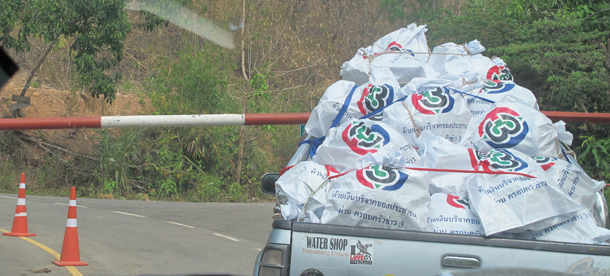BAN MAE SURIN, Thailand —Thai border forces tightened security at Ban Mae Surin refugee camp in Mae Hong Son Province on Sunday, where a blaze earlier in March killed 38 people and displaced more than 2,000.
Local security forces at Ban Mae Surin began stopping vehicles on Sunday and only Thai officials including the military and police are now allowed to access the camp.
People going to the camp to deliver aid on Sunday were told to leave their deliveries at the Khun Yuam district warehouse, adding that from now on deliveries will only be made by local municipal and district offices.
Persons unknown to the authorities will no longer be granted access, the local authorities said, because so many vehicles making the journey each day is causing traffic jams and the road is “broken.”
When The Irrawaddy visited the camp on Sunday, our vehicle was turned around by a Thai army commander, who directed us to seek permission from the Khum Yuam District local government office.
“If I allow you guys access, I will be held responsible. I am not authorized to give you permission. Any action can be taken against me by higher officials,” the commander said, before handing us an official letter with his orders printed in Thai. “So, please go back and ask for entry permission.”
At the local district office, the authorities said we would not be allowed to access the camp and not allowed to deliver the aid supplies we had brought with us.
A woman at the reception told us the reason we were being denied access was because there was no cellphone signal, the road was treacherous, and rescue would be impossible if we got into trouble.
We received no official permission to enter Ban Mae Surin, but managed to enter the camp by following a Thai Channel 3 aid convoy along the serpentine dirt track that leads from Khun Yuam. The commander who turned us around also tried to deny entry to the Channel 3 aid convoy, but eventually let the aid delivery go ahead.
As we left later that afternoon, we discovered from local residents that the border guard force had since been brought in to provide security checks on every vehicle attempting to access the camp, which is in urgent need to humanitarian relief.
Sally Thompson, the director of The Border Consortium (TBC), a humanitarian aid agency, said that it is hard for outside visitors to enter into the camp now as the Thai authorities are clamping down.
The Thais are claiming they are blocking unofficial vehicles entering the camp because of congestion.
But when we arrived at the camp we discovered we were driving one of the few vehicles in the camp that day. Most vehicles in the camp belonged to the Thai military or the police. The road, although difficult to navigate, was not “broken,” as the authorities are claiming.
One possible cause of the heavy security presence is the ongoing police investigation into the fire on March 22, which killed 38 people, camp residents said.
Displaced persons in the camp who escaped the fire are now staying with relatives in unaffected areas, or have set up temporary shelters using waste materials and a few tents from the Office of the UN High Commissioner for Refugees.
Shally Than, the chairwoman of Mae Surin camp, told The Irrawaddy that the refugee committee is now planning its reconstruction program.
The clearance process is under way and will be followed by mapping and reconstruction. The TBC has put out a call for 13 million Thai baht (US $444,000) in donations to rebuild the camp.

















